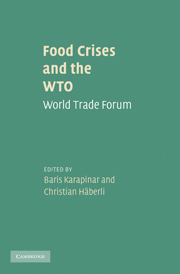Book contents
- Frontmatter
- Contents
- List of contributors
- List of figures
- List of tables
- List of abbreviations
- Preface
- 1 Introduction: food crises and the WTO
- PART 1 Economics of the food crisis
- 2 The food price crisis, poverty and agricultural trade policy
- 3 Globalisation of agriculture and food crises: then and now
- 4 Solving the food crisis in Africa: achieving an African Green Revolution
- 5 Rising food prices: causes, consequences and policy responses
- 6 Shift and swing factors and the special role of weather and climate
- PART 2 Trade and law: WTO and beyond
- 13 Conclusions and policy recommendations
- Index
- References
2 - The food price crisis, poverty and agricultural trade policy
from PART 1 - Economics of the food crisis
Published online by Cambridge University Press: 12 May 2010
- Frontmatter
- Contents
- List of contributors
- List of figures
- List of tables
- List of abbreviations
- Preface
- 1 Introduction: food crises and the WTO
- PART 1 Economics of the food crisis
- 2 The food price crisis, poverty and agricultural trade policy
- 3 Globalisation of agriculture and food crises: then and now
- 4 Solving the food crisis in Africa: achieving an African Green Revolution
- 5 Rising food prices: causes, consequences and policy responses
- 6 Shift and swing factors and the special role of weather and climate
- PART 2 Trade and law: WTO and beyond
- 13 Conclusions and policy recommendations
- Index
- References
Summary
Introduction
Assessing the impacts of changes in food prices on poor people and identifying appropriate policy responses are vitally important because the poorest households spend three-quarters of their budget on food and are therefore particularly vulnerable to increases in food prices. Further, in poor countries, there is no guarantee that increases in the prices of staple foods will reduce poverty even among farmers – many farmers consume much or all of their staple food output and are net buyers of food. At the same time, prices that are too low may provide insufficient incentives for food production and too little income for farmers who obtain a large share of their income from sales of food.
The impacts of food price changes on poverty depend on the distribution and relative intensity of net buyers and net sellers of food among low-income households and not just on whether net-buying or net-selling households predominate (Aksoy and Isik-Dikmelik 2008). While the accumulated evidence that higher prices of staple foods increase poverty in the short run is now very substantial (see, for example, Ravallion 1990; Warr 2005; Asian Development Bank 2008; Demombynes et al. 2008; Wodon and Zaman 2008), increases in at least some food prices may reduce poverty by transferring income to poorer households. The overall effect may also differ considerably between countries depending upon which products poor households buy and sell and the indirect impacts through changes in wage rates for unskilled labour.
- Type
- Chapter
- Information
- Food Crises and the WTOWorld Trade Forum, pp. 25 - 48Publisher: Cambridge University PressPrint publication year: 2010



